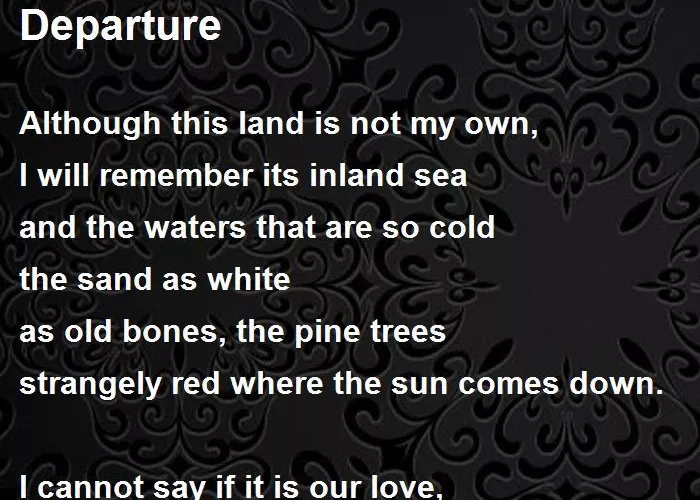Welcome to Poem of the Day – Departure by Anna Akhmatova.
Anna Akhmatova, one of the most prominent Russian poets of the 20th century, is known for her poignant and often melancholic verse that delves deep into the themes of love, loss, and the human condition. One of her most powerful poems, “Departure”, explores the complex emotions tied to the act of leaving and the aftermath of separation. This essay will provide a detailed description and analysis of “Departure”, examining its themes, structure, and emotional depth.
Departure Poem Explanation
At its core, “Departure” is a poem about the painful experience of separation. The speaker’s intense emotions are interwoven with the larger existential reflection on the nature of love, the inevitability of loss, and the subsequent solitude that comes with it. The poem opens with an image of departure—an event that signals the end of a relationship and the beginning of an emotional void. However, Akhmatova does not merely focus on the external act of parting; rather, she delves into the internal, personal consequences of this separation.
The title, “Departure”, signals the focal event of the poem. Yet, Akhmatova’s choice of this word hints at more than just a physical departure; it suggests a metaphorical leaving as well—of emotional intimacy, shared moments, and the depth of connection. The departure is not simply a physical absence but an emotional rupture that resonates long after the person is gone.
The Structure and Language of the Poem
Akhmatova’s language in “Departure” is direct and spare, yet each line carries immense emotional weight. The simplicity of the language enhances the rawness of the speaker’s feelings, making the emotional experience of departure feel immediate and personal. This simplicity also allows the poet to explore complex emotions through subtle shifts in tone and imagery.
The structure of the poem, though unadorned, follows a natural flow that mirrors the emotional progression of the speaker. Akhmatova moves from the initial moments of departure—where the pain is sharp and palpable—to a more contemplative space, where the speaker reflects on the meaning of loss. There is a stark juxtaposition between the external events (the physical departure) and the internal transformation the speaker undergoes. This duality is a central feature of Akhmatova’s poetry, where she masterfully intertwines the external world with the interior emotional landscape.
Imagery and Symbolism
Throughout “Departure”, Akhmatova uses vivid imagery and symbolism to evoke the emotional landscape of the speaker. One of the most striking images in the poem is the description of the departed person leaving behind traces in the speaker’s life. These traces can be understood as remnants of love—fragments that will never disappear but will constantly remind the speaker of the absence. This symbolism of traces, shadows, and echoes underscores the persistent nature of grief, even when the person is no longer physically present.
Another key image in the poem is the use of silence. Akhmatova often evokes silence as a form of emotional communication, a silence that speaks volumes more than words ever could. It is a silence that envelops the speaker, marking the transition from togetherness to solitude. This absence of sound also suggests a sense of emotional numbness or paralysis, where the speaker is left to grapple with feelings that cannot be articulated.
Thematic Exploration of Loss and Time
“Departure” also explores the passage of time and the inevitable nature of loss. There is an acceptance in the poem of the transitory nature of relationships and the inevitability of parting. However, this acceptance does not make the experience any easier. Rather, it amplifies the sorrow, as the speaker is acutely aware of the fleeting nature of connection. Akhmatova captures this tension between the fleeting and the eternal—how love, though finite, leaves a lasting imprint that transcends time.
The poem’s melancholy reflects the poet’s broader engagement with the theme of suffering, a theme that runs throughout much of Akhmatova’s work. In the context of her tumultuous personal life, marked by the loss of loved ones and the hardships of living under Soviet repression, the emotional resonances of “Departure” can be seen as both personal and universal. The poet transforms her personal experience of loss into a meditation on the human condition—how departure, in all its forms, is a fundamental aspect of life.
Conclusion
In “Departure”, Anna Akhmatova crafts a powerful meditation on the sorrow of separation, the silence that follows, and the enduring impact of loss. Through her simple yet poignant language, the poet conveys the depth of emotional devastation that accompanies a loved one’s departure. The poem’s vivid imagery, structural elegance, and symbolic complexity work together to convey the rawness of grief and the persistence of memory. Ultimately, “Departure” is not just a poem about leaving but a reflection on the human experience of love and loss, making it one of Akhmatova’s most emotionally resonant works.

